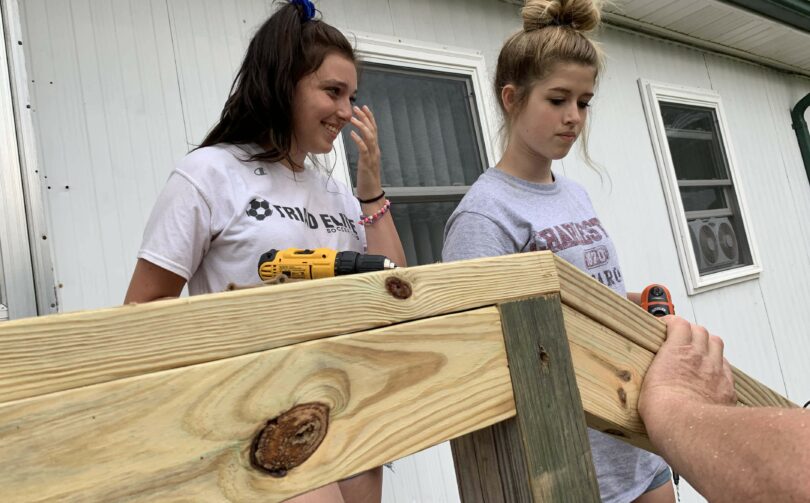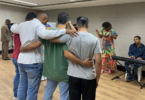(Mission Camp participants helping to install a handicap ramp in rural Appalachia)
For the Good of Others
by Bishop Chris Giesler
Preaching Text: Matthew 11:16-19, 18-23
If Jesus had acted in his own self-interest, following his example would be a lot easier. Running counter to the society of his day, and indeed for ours today, for Jesus, it was all about self-denial. And I know that somewhere deep within the recesses of my soul is a lesson taught to me by numerous wise elders, “God first, others second, yourself last. “
That being said, I genuinely believe that there needs to be adequate self-care so that we do have something to give to others. However, for much of our society, the understood mode of operation is to take all that you can for yourself.
When Jesus first told his disciples that he was about to head to Jerusalem and that when he got there, he would be arrested, persecuted, and ultimately killed, Peter vehemently objected. As a matter of fact, the text says: “And Peter took him aside and began to rebuke him, saying, ‘God forbid it, Lord! This must never happen to you” (Matthew 16:22). Now, if Jesus had acted in his own self-interest he would have responded by saying, “You Peter, on second thought, that persecution and death stuff does sound painful, your right, let’s go to the beach instead.” But thanks be to God; that is not what Jesus said; instead, he said, “Get behind me Satan! You are a stumbling block to me; for you are setting your mind not on divine things, but on human things.” Matthew 16:23
If Jesus had acted in his own self-interest, following his example would be a lot easier.
Many Moravian Congregations on this particular Sunday will remember the life and witness John Hus, who was burned at the stake on July 6, 1415. John Hus was a gifted teacher at the prestigious Charles University in Prague. But instead of hanging his hat and spending all of his time celebrating his gift and reputation, he also became the pastor at the Bethlehem Chapel, located in one of the grungiest, crime-ridden parts of this major European city. One of the reasons he knew that people were not getting the message was that even if they showed up for Church, none of them could understand the service, which was supposed to be held in Latin by law. But Hus denied himself, welcomed the burden of these people upon himself, and chose to peach in the native Czech language.
Furthermore, because the common people were excluded from partaking of the cup at communion time, they were made to feel unworthy of the grace it represented. So, John Hus denied himself, welcomed their burdens upon himself, and extended the cup to all. Furthermore, these poor people had been told for years that if they did not fork over money to the church, neither their sins nor the sins of their families would be forgiven, thereby banishing all of them to a certain hell. So, John Hus took the burdens of his people upon himself and tried to reform his church to do away with this practice. For all of this self-denial, John Hus was dragged before a Church Council, condemned to death, and ultimately burned at the stake.
Why would a man do all of this? Perhaps it was the example of Jesus’ self-denial. There, John Hus found that Jesus could carry his burden, lighten his load, and enable him to carry the burden of others.
Jesus said, “Come to me, all you that are weary and are carrying heavy burdens, and I will give you rest.” That is a profound statement of self-denial on Jesus’ part.
Several years ago, I had the pleasure of visiting the Statue of Liberty in the New York City Harbor. I had been there several times before as a child and then again with my children but had never taken the time to read and ponder the words of “The New Colossus.” This is the poem written by Emma Lazarus in 1883. It was written to raise money for the construction of the pedestal of the statue. It truly is a statement about self-denial for the United States, a sentiment that we have a hard time living up to today. Here are those beautiful words:
The New Colossus
Not like the brazen giant of Greek fame,
With conquering limbs astride from land to land;
Here at our sea-washed, sunset gates shall stand
A mighty woman with a torch, whose flame
Is the imprisoned lightning, and her name
Mother of Exiles. From her beacon-hand
Glows world-wide welcome; her mild eyes command
The air-bridged harbor that twin cities frame.
“Keep, ancient lands, your storied pomp!” cries she
With silent lips. “Give me your tired, your poor,
Your huddled masses yearning to breathe free,
The wretched refuse of your teeming shore.
Send these, the homeless, tempest-tost to me,
I lift my lamp beside the golden door!”
To consider ourselves to be a follower of Jesus and to accept the mission that he carried in his own life, we must take these words to heart. It is about denying some of our own comfort for the good of others. It is about denying some of our financial blessings for the good of others. It is about denying some of our own shelter for the good of others. It is about denying some of our own water for the good of others. It is about denying some of our own food for the good of others. It is about denying some of our own time for the good of others.







